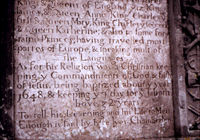"A Christian keeping the commandment of God and the faith of Jesus, being baptised about the year 1648, and keeping the seventh day for the Sabbath above thirty-two years." Monument over the grave of Dr. Peter Chamberlain
Hungary, Romania
"But as they rejected Sunday and rested on the Sabbath, Prince Sigmond Bathory ordered their persecution. Pechi advanced to position of chancellor of state and next in line to throne of Transylvania. He studied his Bible, and composed a number of hymns, mostly in honour of the Sabbath. Pechi was arrested and died in 1640.
Sweden And Finland
"We can trace these opinions over almost the whole extent of Sweden of that day-from Finland and northern Sweden. "In the district of Upsala the farmers kept Saturday in place of Sunday. "About the year 1625 this religious tendency became so pronounced in these countries that not only large numbers of the common people began to keep Saturday as the rest day, but even many priests did the same." History of the Swedish Church, Vol.I, p.256
Muscovit Russian Church
"They solemnize Saturday (the old Sabbath). Samuel Purchase- "His Pilgrims." Vol. I, p. 350
India - 1625 (Jacobites)
"They kept Saturday holy. They have solemn service on Saturdays." Pilgrimmes, Part 2, p.1269
America - 1664
"Stephen Mumford, the first Sabbath-keeper in America come from London in 1664." History of the Seventh-day Baptist Gen. Conf. by Jas. Bailey, pp. 237, 238
America - 1671 (Seventh-day Baptists)
"Broke from Baptist Church in order to keep Sabbath." See Bailey's History, pp. 9,10
America 1603-1683
“ The pretended Vicar of Christ on earth, ... speaking against the God of heaven, thinking to change times and laws; but he is the son of perdition.” Roger Williams, First Baptist pastor in America (1603-1683) -- The Bloody Tenet of Persecution, quoted in L. E. Froom, The Prophetic Faith of Our Fathers, vol. 3, p. 52. Emphasis supplied.
England
Charles I,1647 (when querying the Parliament Commissioners) "For it will not be found in Scripture where Saturday is no longer to be kept, or turned into the Sunday wherefore it must be the Church's authority that changed the one and instituted the other." Cox, "Sabbath Laws," p.333
England - John Milton
"It will surely be far safer to observe the seventh day, according to express commandment of God, than on the authority of mere human conjecture to adopt the first." Sab. Lit. 2, 46-54
England
"Upon the publication of the 'Book of Sports' in 1618 a violent controversy arose among English divines on two points: first, whether the Sabbath of the fourth commandment was in force; and, secondly, on what ground the first day of the week was entitled to be observed as 'the Sabbath.'" Haydn's Dictionary of Dates, art. "Sabbatarians." p.602
Ethiopia - 1604
Jesuits tried to induce the Abyssinian church to accept Roman Catholicism. They influenced King Zadenghel to propose to submit to the Papacy (A.D.1604). "Prohibiting all his subjects, upon severe penalties, to observe Saturday any longer." Gedde's "Church History of Ethiopia." p.311, also Gibbon's "Decline and Fall," ch. 47
England - 1618
"At last for teaching only five days in the week, and resting upon Saturday she was carried to the new prison in Maiden Lane, a place then appointed for the restraint of several other persons of different opinions from the Church of England. Mrs. Traske lay fifteen or sixteen years a prisoner for her opinion about the Saturday Sabbath." Pagitt's "Heresiography." p.196
England - 1668
"Here in England are about nine or ten churches that keep the Sabbath, besides many scattered disciples, who have eminently preserved." Stennet's letters, 1668 and 1670. Cox, Sab.,1, 268
Bohemia, Moravia, Switzerland, Germany
"one of the counsellors and lords of the court was John Gerendi, head of the Sabbatarians, a people who did not keep Sunday, but Saturday." Lamy, "The History of Socinianism." p. 60
Telegraph Print, Napier

St. Margaret's Chapel in Essex, England, contains the tombstone of Puritan Sabbath keeper Dr. Peter Chamberlen, a respected, trusted, and much loved physician to three sets of kings and queens in 17th century England.
The inscription on the tombstone reads as follows:"The said Peter Chamberlen toock ye degree of Doctor in Physick, in fever all Universities born att home and abroad and lived such above three score years being physician in ordinary to three Kings and Queens of England. viz. King James & Queen Anne; King Charles ye first & Queen Mary; King Charles ye second & Queen Katherine; & also tosome forraine Princes; having travelled most of partes of Europe and speaking most of the languages.
As for his religion he was a Christian keeping ye Commandments of God & faith of Jesus. being baptized about ye year 1648, & keeping ye 7th day for ye saboth above 32 years.
To tell his Learning and his Life to Men: Enough is said by here lyes Chamberlen."